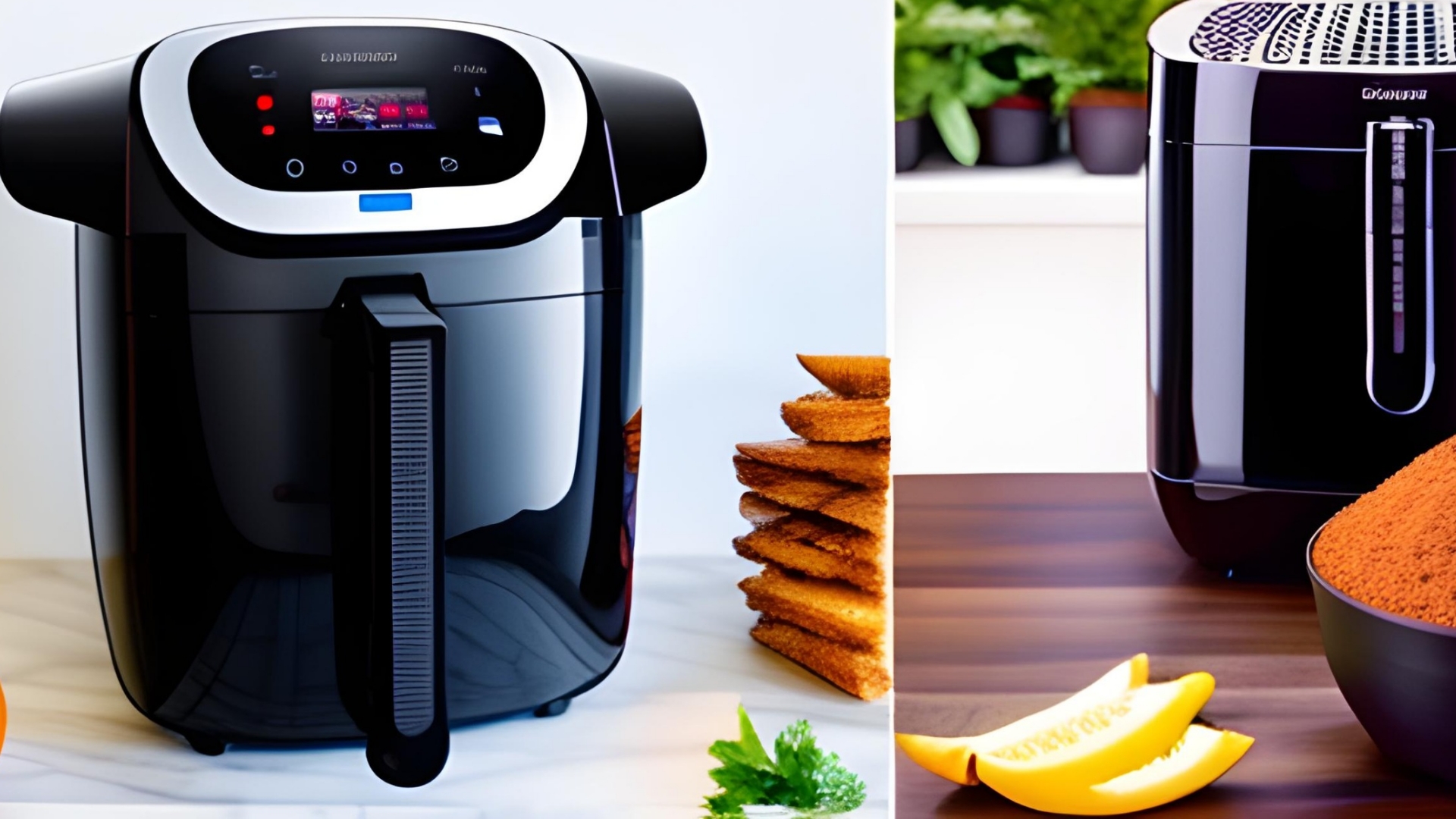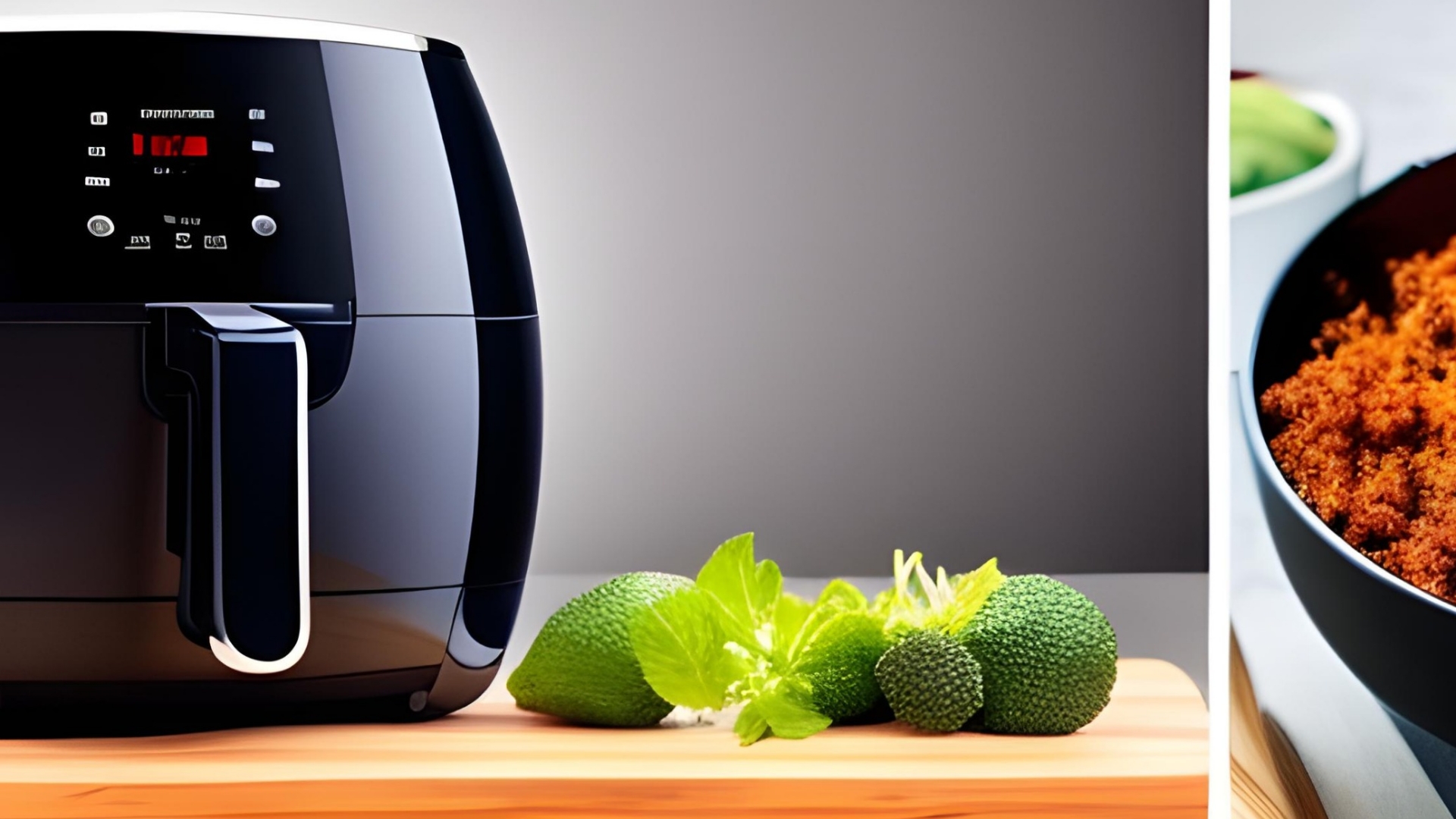Last Updated on July 14, 2023 by MOe
Introduction
When it comes to cooking methods, two popular contenders often dominate the culinary landscape: air frying and deep frying.
Both techniques have their unique merits and can deliver mouthwatering results, but which one is truly better for you?
In this article, we will delve into the world of air fryer vs deep fryer examining their differences, benefits, and drawbacks.
By the end, you’ll have a clearer understanding of these cooking methods and be able to make an informed decision based on your preferences and health goals.
Understanding Air Frying
Let’s start by demystifying the concept of air frying.
Air frying is a cooking method that involves circulating hot air around the food to produce a crispy and golden exterior, akin to the texture achieved through deep frying.
The key difference lies in the minimal amount of oil used in air frying, as it typically requires just a fraction of the oil used in deep frying.
Instead of submerging the food in oil, air fryers rely on convection currents to evenly distribute the heat and create the desired crispiness.

Exploring Deep Frying
On the other side of the frying spectrum, we have deep frying, a technique that has been cherished for centuries.
Deep frying involves immersing the food completely in hot oil, resulting in a richly browned and crispy exterior.
The immersion in oil creates a seal around the food, locking in moisture and imparting a unique flavor profile.
Deep frying has long been associated with indulgent treats like French fries, chicken wings, and doughnuts, providing that irresistible crunch we often crave.
Comparing Flavor and Texture
When it comes to flavor and texture, both air frying and deep frying offer distinct advantages.
Deep frying tends to yield a more pronounced and indulgent flavor, thanks to the immersion in oil.
The high heat of the oil also creates a rapid Maillard reaction, resulting in a beautifully caramelized exterior.
The texture achieved through deep frying is undeniably crispy and satisfying, with a delightful contrast between the crunchy exterior and the tender interior.
Air frying, on the other hand, produces a lighter flavor profile.
While it may not reach the same level of richness as deep frying, air frying can still deliver a pleasing crispness without the excessive greasiness.
The reduced oil content allows the natural flavors of the food to shine through, making it a favorable choice for those who prefer a more subtle taste.
The texture achieved in air frying is also commendable, with a crispy outer layer that can rival the results of deep frying.
Health Considerations
One of the primary factors that sets air frying apart from deep frying is its health implications.
Deep frying often involves submerging the food in a significant amount of oil, which can lead to a higher calorie content and increased fat absorption.
The excessive oil can also contribute to a greasy mouthfeel and leave you feeling heavy after indulging in deep-fried delights.
If you are watching your calorie intake or aiming for a healthier lifestyle, deep frying may not align with your goals.
Air frying, on the other hand, offers a healthier alternative.
By using minimal oil, air frying significantly reduces the calorie and fat content of the food.
This can be particularly advantageous for individuals who are conscious of their dietary choices or have specific health conditions.
However, it’s important to note that the overall healthiness of the dish also depends on the food being cooked.
Opting for lean proteins, whole grains, and a variety of vegetables will maximize the nutritional value of your air-fried meals.

Cooking Convenience
In terms of convenience, air frying takes the lead in several aspects.
Air fryers are generally compact and easy to use, making them a suitable choice for individuals with limited kitchen space.
They also preheat quickly and offer precise temperature control, allowing you to cook your favorite dishes efficiently.
Moreover, air frying eliminates the need for messy oil disposal and reduces the post-cooking cleanup, making it an attractive option for those seeking a hassle-free cooking experience.
Deep frying, while undoubtedly delicious, requires more preparation and cleanup.
The process of heating and maintaining a large quantity of oil can be cumbersome, and the oil itself needs to be carefully discarded after use.
Additionally, the lingering smell of frying oil in the kitchen may not be desirable for everyone.
If you value simplicity and ease of use, air frying might be the more practical choice for your culinary endeavors.
Environmental Impact
Considering the environmental impact of our cooking methods is becoming increasingly important in today’s world.
Deep frying, with its reliance on large quantities of oil, raises concerns about waste generation and disposal.
Used frying oil can pose challenges for proper disposal and recycling, potentially contributing to pollution if not handled appropriately.
By contrast, air frying reduces the overall oil consumption, resulting in less waste and a smaller ecological footprint.

Final Thoughts
In the air frying versus deep frying debate, there is no definitive winner.
The choice between the two methods ultimately depends on your personal preferences, dietary goals, and lifestyle considerations.
If you’re looking for a healthier option that still delivers satisfying crispness, air frying is a fantastic choice.
On the other hand, if you prioritize indulgence and are willing to embrace the richness of deep-fried foods, then deep frying might be your go-to technique.
Whichever path you choose, remember to enjoy your culinary adventures while making informed decisions that align with your needs and desires. Happy frying!
FAQs: Air Frying vs Deep Frying
Q: Is air frying a healthier cooking option compared to deep frying?
A: Yes, air frying is generally considered a healthier cooking option.
It requires minimal oil, significantly reducing calorie and fat content, making it a suitable choice for those aiming for a healthier lifestyle or watching their calorie intake.
Q: Does air frying provide the same level of crispiness as deep frying?
A: While air frying can deliver a satisfying crispiness, it may not reach the same level as deep frying.
Deep frying achieves a more pronounced and indulgent crispness due to the immersion in hot oil, creating a distinct texture that air frying aims to replicate with less oil.
Q: Can air frying replicate the flavor of deep-fried foods?
A: Air frying produces a lighter flavor compared to deep frying.
While it may not achieve the same level of richness, air frying can still provide a pleasing crispness without excessive greasiness.
The reduced oil content allows the natural flavors of the food to shine through.
Q: Which cooking method is more convenient, air frying, or deep frying?
A: Air frying is generally more convenient due to its compact size, ease of use, and quick preheating.
Air fryers offer precise temperature control and require minimal cleanup since there is no need to dispose of large quantities of oil.
Deep frying, on the other hand, involves more preparation and cleanup.
Q: Can air frying be used for a wide variety of foods?
A: Yes, air frying can be used for a wide variety of foods.
From crispy french fries to chicken wings and even desserts, air fryers can handle a diverse range of dishes.
However, certain foods may require adjustments in cooking times and techniques to achieve optimal results.
Q: Does deep frying impart a unique flavor to the food?
A: Absolutely! Deep frying imparts a distinct flavor to the food due to the immersion in hot oil. The high heat creates a rapid Maillard reaction, resulting in a beautifully caramelized exterior and a rich, indulgent taste that is synonymous with deep-fried delights.
Q: Are there any environmental considerations when choosing between air frying and deep frying?
A: Yes, there are environmental considerations. Deep frying requires larger quantities of oil, which can lead to more waste generation and disposal challenges.
Air frying, with its reduced oil consumption, results in less waste and a smaller ecological footprint, making it a more environmentally-friendly option.
Q: Can air frying achieve similar cooking results as deep frying?
A: While air frying can produce commendable results, it may not achieve identical cooking outcomes as deep frying.
Deep frying, with its full immersion in hot oil, creates a specific texture and flavor that can be challenging to replicate using the air frying method.
Q: Can air frying help reduce the greasiness associated with deep-fried foods?
A: Yes, air frying can help reduce greasiness.
By using minimal oil, air frying eliminates excessive greasiness commonly associated with deep-fried foods.
The result is a lighter, less oily texture while still maintaining a desirable crispness.
Q: Are there any specific foods that are better suited for air frying or deep frying?
A: Both air frying and deep frying have their strengths when it comes to specific foods.
Air frying works well for foods that benefit from a lighter, crisp texture, such as vegetables, chicken tenders, or fish fillets.
Deep frying, on the other hand, is ideal for foods that require a rich, indulgent flavor and a deep, crispy exterior, like doughnuts or battered chicken.
Q: Can air frying be a suitable alternative for individuals with dietary restrictions or health conditions?
A: Yes, air frying can be a suitable alternative for individuals with dietary restrictions or health conditions.
With its reduced oil content, air frying allows for a healthier cooking option while still providing a satisfying texture and taste.
However, it’s important to consider individual dietary needs and consult with a healthcare professional if necessary.
Q: Is there a significant difference in cooking times between air frying and deep frying?
A: Cooking times can vary between air frying and deep frying, depending on the specific recipe and the food being cooked.
Generally, air frying may require slightly longer cooking times compared to deep frying, as the hot air needs to penetrate and cook the food thoroughly.
Q: Can air frying be used to reheat leftovers?
A: Yes, air frying is an excellent method for reheating leftovers.
It helps retain the crispness of fried foods while reheating them more evenly than traditional methods like microwaving.
Air frying can revitalize leftovers, giving them a fresh, crispy texture similar to their original state.
Q: Are there any specific precautions or safety considerations for air frying and deep frying?
A: Both air frying and deep frying involve working with high heat, so certain precautions should be taken.
It is important to carefully read and follow the instructions provided with your air fryer or deep fryer.
Additionally, handling hot oil requires caution to avoid burns, and proper ventilation is necessary to prevent the buildup of cooking odors and fumes.
Q: Can you achieve similar results by combining air frying and deep frying methods?
A: Combining air frying and deep frying methods, also known as “twice frying,” can indeed produce exceptional results.
This technique involves air frying the food first to cook the interior, followed by a quick deep-frying session to achieve the desired golden and crispy exterior.
This combination can result in a textural contrast that brings together the best of both methods.
